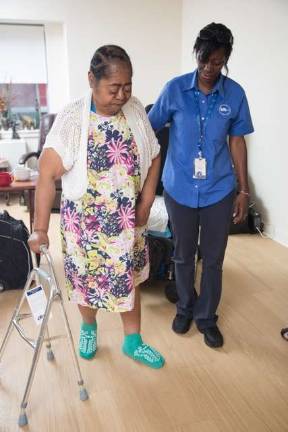Falls Prevention for older new yorkers

The first day of fall — September 22 — begins National Falls Prevention Awareness Week, an effort to educate people about how to prevent and reduce falls, especially among older adults. Nearly all 50 states, including New York, will participate in Falls Prevention Awareness Week activities this year. It’s a good time to talk about what family caregivers can do to help reduce this epidemic.
In the United States, more than 11 million people over the age of 65 fall each year — that’s one of every three senior citizens in the country! Aside from the injuries and even death that might result, falling can lead to decreased mobility and even more fear of falling, which in turn can limit a person’s independence and negatively affect their quality of life.
As a registered nurse with VNSNY CHOICE Health Plans, an affiliate of the not-for-profit Visiting Nurse Service of New York, I work closely with the elderly and their loved ones to develop a health care plan that addresses each patient’s individual needs, helping them live safely and independently in the home.
I’m often asked by family caregivers who don’t live with their older parents for advice on how to keep their loved ones safe. Here are a few things to keep in mind to help at-risk seniors avoid serious fall-related injuries.
• Age Matters: While falls can happen to people of all ages, the older you are, the more susceptible you are to injury, and recovery becomes more challenging. In fact, people age 75 and older who fall are four to five times more likely than those age 65 to 74 to be admitted to a long-term care facility for a year or longer.
• Know Your Meds? Taking four or more medications, especially those that may cause side effects or interactions such as dizziness or drowsiness, increases one’s risk of falling. You should talk with your primary doctor about any side effects your family member is experiencing from medications. Taking medicine with a meal or before bed or working with the doctor to have lowest possible dosages might help ameliorate some symptoms.
• Seeing Clearly: Family caregivers should encourage older loved ones to get an annual vision exam, because failing vision can go unnoticed when someone is able to carry out daily activities such as reading the paper or watching television. Vision problems can be the cause of a trip or fall and improving vision can go a long way to keeping seniors safe on their feet.
• Safe Home: It’s important to make periodic assessments of the home to reduce tripping hazards. Keep pathways clear of clutter and well-lit, make sure floors are dry, ensure that stairs are level and evenly spaced, and install handrails wherever there is more than one step down. Also, carefully gather wires, and tape down carpets. Bathtubs should have a bath mat to prevent slips and falls, a tub seat for individuals with poor balance, and grab bars in the bathroom so no one is tempted to grab onto a towel bar (which is not meant to support weight). • Keep On Your Feet: Research says if you’re over 65, you increase your risk of falling if you walk barefoot or only with socks. Our reflexes decrease as we age, so if your family member happens to step on something injurious, the reflex that causes him or her to hop off it may cause them to fall. Encourage your family member to wear comfortable well-fitting shoes both around the house and outside. Avoid shoes that have open toes or open heels which can cause the individual to trip or lose their balance if the heel comes off the shoe.
• Assistive Devices: If your family member uses a cane, walker or crutch, make sure it fits properly in terms of height and handle grip size, and that they use it correctly. Avoid borrowing devices from others, since assistive devices are not one size fits all. At least once a month, turn it upside down and make sure the rubber tips are in good shape and change them if they show signs of wear.
• Keep Your Balance: Good balance is important to prevent falls. But a person’s balance may be affected by illness or medication. Avoid bending or looking down as you walk as this causes the balance to shift, making the individual more prone to fall. Walking straight is best.
Alicia Schwartz, MSN, RN, is care coordinator with VNSNY CHOICE Health Plans. For more information please visit s or call 1-888-867-6555.